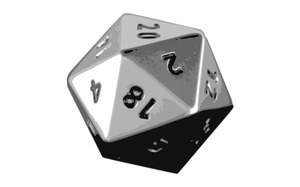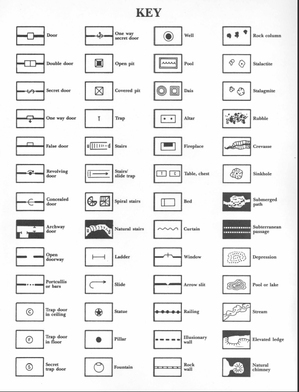
Warning: long, long non music post
"This is a game that is fun. It helps you to imagine."
F. Mentzer, Preface to the Basic Boxed Set. Feb. 1983.
Dungeons & Dragons (D&D) is a table top role-playing game (RPG) that I have played since I was about 12. I'm 39. Now we have the news that current owning company Wizards of the Coast are play testing the 5th Edition.
Also, a recent game of V4 means that I have now played all the existing editions organically. I mean, as they were current.
Here is an excellent mid length article to summarize. But I'm going to go on about the same thing anyway.
So, on to my thoughts ...
Lets start with the basics. In Dungeons & Dragons, a referee (The Dungeon Master or DM) talks you through a story/adventure in a fantasy medieval world (the playing experience). The players have characters and dice rolls are used to decide random elements like fights and feats of skill (the mechanics). It's like an interactive version of Lord of the Rings where you get to create your own worlds and stories. It's social and creative and has lasted 50 years. Here's a potted history of the editions.

early 70s - 1977
The legend Gary Gygax and friends develop D&D from their wargame Chainmail. They use it as a platform to solidify their company TSR. This era is thought of as Version Zero as they hand print and distribute booklet versions of the early rules.
1977 - 1989 (and beyond)
In '77 TSR put out the first edition of Advanced Dungeons & Dragons and it was properly/widely published. They also put out a Dungeons & Dragons boxed set, a simplified version for younger players to get started. These became two games, in a way, as they were both fine and had their own strengths.
So now the game had really arrived. All further publications were pre-made adventures (Modules) and optional expansions/game worlds. AD&D introduced the concept of the core-rules: The Player's Handbook, The DM's Guide and the Monster Manual. With these three you had all you need to play and create.
This then just went on, for some it has never ended. I was introduced to the game through the boxed set, and like most people of my generation played The Keep on the Borderlands as my first adventure. We called it Basic and played it the most of any version, using the simple modules or our own stuff. I'll play it tomorrow if you want to. It rules. I suppose I would have bought it first time around 1984.

1989
In 1989, after 12 successful years. TSR put out the AD&D 2nd Edition. A massive update of the rules. And the first of a series of, in my view, pointless updates. It was changes, not improvements. For example, taking out the planes and demons because of Satanic Panic in the USA at the time. In my gaming world, this edition was roundly ignored.
So for me, and many others, the golden era was 1977 - 1999.
1997/99 - 2008 Wizards of the Coast
Oh, TSR. TSR fucked up and bankrupted themselves.Wizards of the Coast bought them up and started claiming the game. But something very important came out of this.
During the golden years of RPGs, there were all kinds of games developed and published within the community. Gamers themselves wrote their own games as the mechanics and play of RPGs were very similar. We were clearly entering a new era and after much debate, Wizards conceded that the core mechanic - the d20 system - could not be owned. There is now an open source legal contract allowing anyone to use it to make, play and publish games.
WotC gave the game modern presentation and improved art and packaging. A new generation of fans came in knowing only their new version, the Third Edition. This was quickly updated to Version 3.5 a couple of years later. It tried to level the field for characters with Skills and Feats.
2008 - present
And then came the Fourth Edition.
This newest version of the game was supposed to be a response to player feedback, and has been criticised as a response to computer RPG culture. In my view, it is the first to radically alter the game standards with the Powers system. And just 4 years later, number 5 is coming.
So ...
Number 5 is supposed to be fixing the problem of having too many versions ... by adding a version. But the reason so many people just stick to the TSR era is that there was nothing wrong with it. And the reason so many people stick with 3.5 is that they came into D&D with that version and can't be bother to start a new game.
Adding things to D&D is odd. At the turn of the TSR era, and before Wizards made versions 3 through 5, we all solidified this concept of the d20 system. That is, the game has a core mechanic and then the joy of it is that you create the rest yourself, through the playing experience or through writing. Adding to it, in one way or another, is the main part of the game. The job of the flagship publisher is to distribute the core system and to create optional supplements/adventures for people who don't have the time to write stuff.
The basic boxed set was the best thing ever done because it simplified/clarified the core concepts and the first edition AD&D rules showed clearly the split between the core and the extras.
All the subsequent versions are like separate games. All can be played and enjoyed. But in the grand scheme of things, the 4th Ed is clearly a fuck up - but so were versions 2, 3 and 3.5. How is making a 5th going to fix things. Why not go back to the first edition and do a logical clean up. Make the MM look nicer and include a more complete monster list, for example. Adding a 5th is just going to be adding a 5th game, not a definitive game.
We've all been clear since 99 that the definitive game is the d20 mechanic + the playing experience. The rest is up to you.